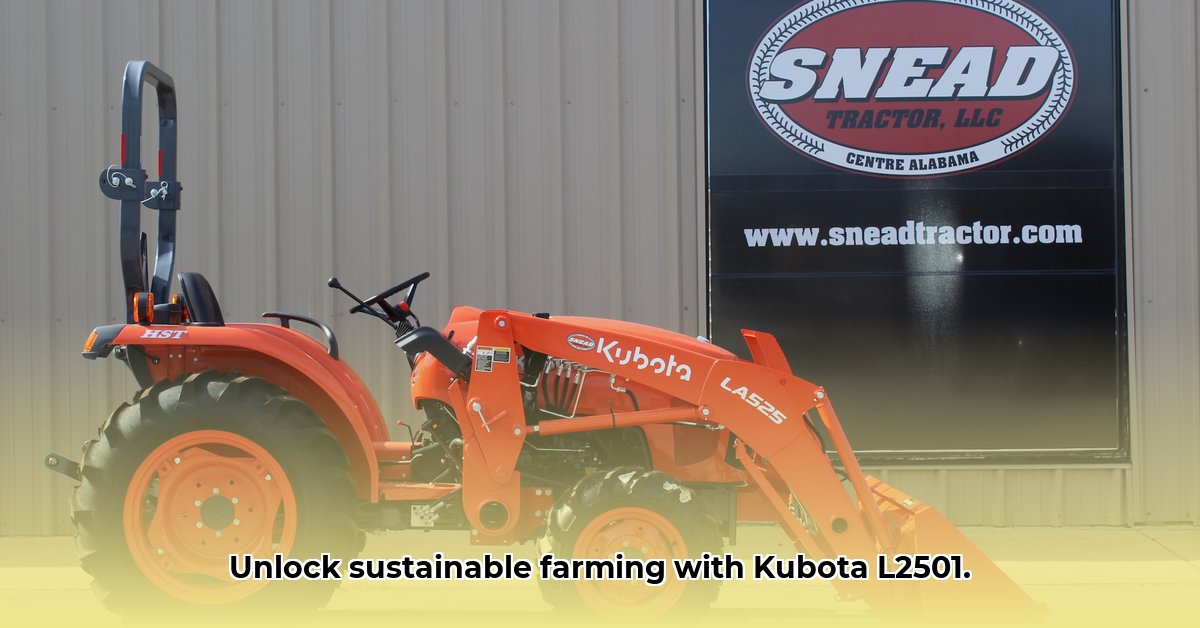
Power and Performance: A Compact Force for Sustainable Practices
The Kubota L2501, a compact tractor popular among smaller farms, presents an interesting case study in sustainable agriculture. Its 24.8 horsepower (gross) engine provides sufficient power for a range of tasks common to small-scale operations, including tilling, planting, mowing, and light hauling. The 8-speed hydrostatic transmission ensures smooth and precise control, ideal for navigating tight spaces within orchards or vineyards – crucial for minimizing crop damage and optimizing land use. The tractor's relatively low weight, between 2425 and 2623 lbs, minimizes soil compaction, a critical factor for maintaining soil health, nutrient retention, and water absorption. Compacted soil hinders root growth and reduces yields, impacting long-term sustainability. For more Kubota compact tractor models, see this helpful page.
But how does this translate to real-world sustainable farming? Does this compact power truly deliver on its promise of efficiency?
Sustainability Assessment: A Balanced Perspective
The L2501's lighter weight offers a clear advantage in sustainable agriculture by reducing soil compaction. However, a comprehensive evaluation requires more data than currently available. While its compact size suggests better fuel efficiency compared to larger tractors, concrete data on fuel consumption and emissions is lacking. This absence of crucial information limits a definitive assessment of its overall environmental footprint. Independent studies focusing on fuel consumption and greenhouse gas emissions are needed to complete the picture. This lack of transparency is a broader issue affecting the agricultural machinery sector, with many manufacturers failing to provide comprehensive environmental impact assessments.
The L2501's maneuverability is another potential benefit for sustainable practices. Precision planting and targeted applications of fertilizers and pesticides minimize resource waste and reduce environmental impact. However, can the L2501 efficiently handle the implements required for these practices on a larger scale or across varied terrain? This requires further analysis.
Isn't complete transparency on environmental impact critical to adopting sustainable practices?
Cost Analysis: A Long-Term Investment
The initial purchase price of the L2501 is a significant consideration, especially for smaller farms with limited budgets. However, the long-term cost of ownership, encompassing fuel consumption, maintenance, repairs, and potential resale value, is equally important. Unfortunately, detailed data on these aspects is currently unavailable, making it difficult to provide a precise economic assessment. Access to comprehensive long-term cost analyses would assist farmers in making informed decisions based on their specific farming contexts and operational scales. How can farmers truly evaluate long-term affordability without a clear picture of operational costs?
Comparison with Competitors: A Need for Standardized Data
Direct comparisons with competing compact tractors are hampered by the lack of standardized data across the industry. Key factors for comparison include fuel efficiency, maneuverability, and the availability of attachments suitable for sustainable practices like reduced tillage or precision application technologies. A standardized data collection effort would greatly benefit both farmers and manufacturers, fostering informed decision-making and promoting innovation in sustainable agricultural machinery. How can one choose the best option without reliable comparison metrics?
User Feedback: Gathering Real-World Experiences
User reviews offer invaluable insights into the real-world performance of the Kubota L2501 in diverse agricultural settings, providing crucial information unavailable from manufacturer specifications. While this review currently lacks access to sufficient user testimonials from sustainable farming contexts, gathering and analyzing this feedback is critical for a more comprehensive assessment. Further research could investigate farmer experiences and gather data on the tractor's performance in diverse soil conditions and operational scenarios. Isn't it vital to hear directly from those who use this equipment daily?
Conclusion: A Promising Start, but Data is Key
The Kubota L2501 displays several features aligning with sustainable agricultural practices, particularly its reduced soil compaction attribute. However, the absence of comprehensive data on fuel efficiency, emissions, long-term operational costs, and user experiences from sustainable farming contexts limits a definitive assessment of its suitability. Further research and industry transparency are crucial for providing farmers with the information they need to make informed decisions. The need for comprehensive data is paramount for informed decision-making in sustainable agriculture.
Recommendations: Steps Toward Sustainable Choice
For small-scale farmers considering the L2501, consider these points:
- Thoroughly research available attachments: Ensure compatibility with your specific farming tasks and assess their impact on overall efficiency and sustainability.
- Carefully assess your operational needs: Match the tractor's capabilities to your farm size, terrain, and specific farming practices.
- Investigate financing options: Explore various financing options to manage the initial purchase cost effectively.
- Engage with fellow farmers: Seek advice from other farmers who have experience with the L2501 or similar tractors in comparable settings. This experiential knowledge will prove invaluable.
Investing in sustainable agricultural practices requires informed choices. By addressing the data gaps highlighted in this review, the agricultural machinery industry can better serve the needs of farmers and contribute significantly to the broader goals of environmental sustainability.